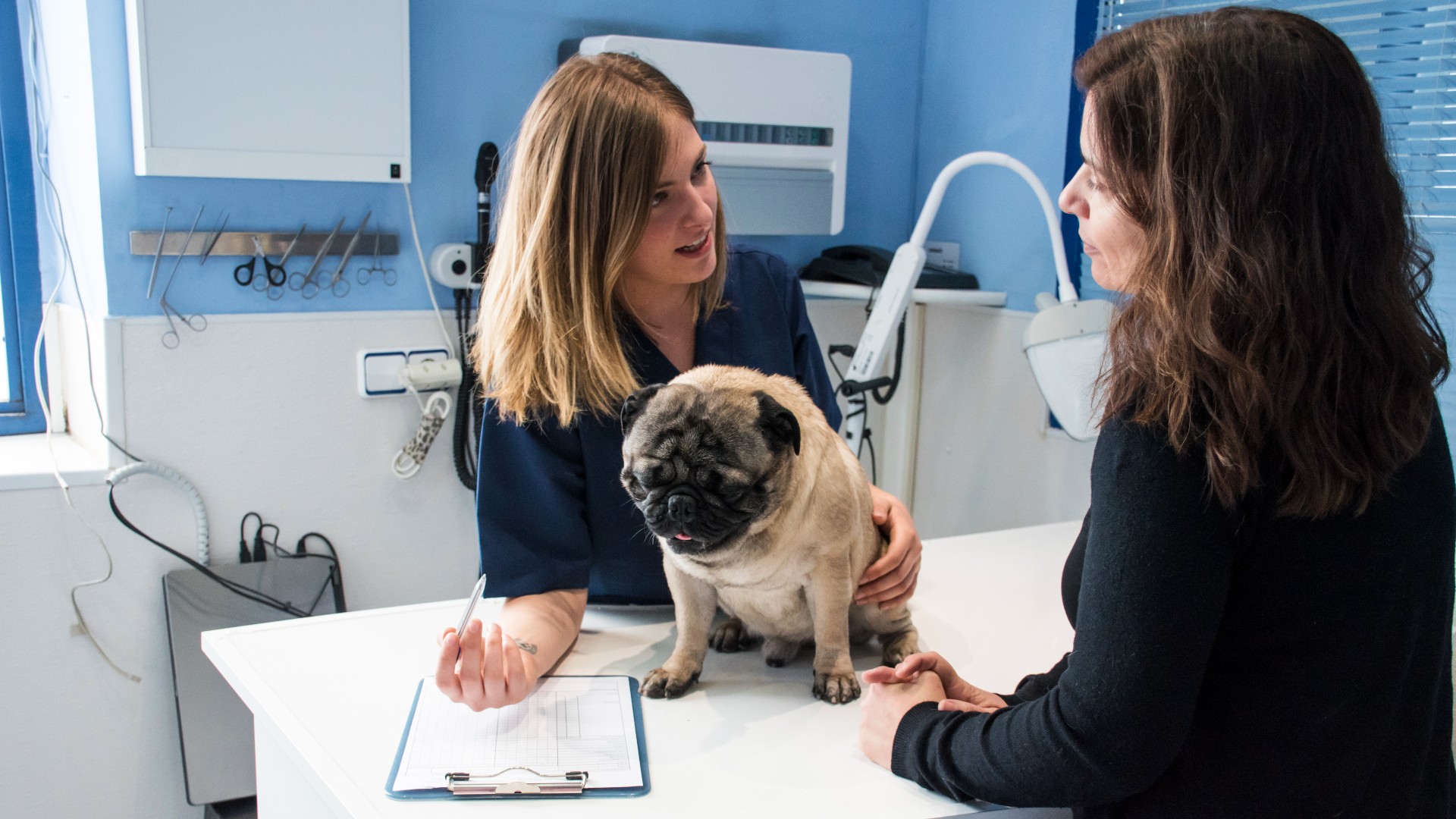Dog food allergy tests: Do they work and are they worth it?
Dog food allergy tests are rising in popularity, but are they really effective? Our vet reveals the answer.

If your dog has sensitivities, you might consider getting a dog food allergy test to see what’s causing the issues. These tests are very convenient as you can do them at home, but are they the best way to identify allergies?
The most common meat allergies are beef and chicken which are found in most pet food. That’s why it’s a good idea to feed your dog a novel protein (like salmon or venison) as they probably haven’t had it before and wouldn’t have developed a sensitivity. Dogs might also be allergic to dairy or fillers like corn, soy, or gluten.
If you’re struggling to get to the bottom of what your dog’s allergies are, you might be tempted to try a dog food allergy test. Whilst they seem good on paper, vets say the best way to diagnose an allergy is with a food trial. Once you’ve figured out the problem, you can then switch to the best dog foods for allergies.
We asked vet Dr. Catherine Barnette whether dog food allergy tests are accurate, how they work, and how much they cost. Here’s everything you need to know before you buy one:
Can you test dog allergies at home?
In recent years, several “at home” allergy testing kits have been developed and marketed for dogs. These tests claim to be able to diagnose your dog’s allergies using a small sample of your dog’s fur or saliva, which is then sent to a laboratory for analysis.
While this sort of testing may sound convenient and appealing, the results of these tests should be regarded as suspect. In fact, according to the VIN News Service, one company failed to recognize fake hair and fake saliva when submitted by researchers, which makes veterinarians question the testing that is really taking place on the samples submitted by clients.
Given the numerous questions about the validity of these at-home tests, you are probably better off investing your money in appropriate vet-recommended allergy testing.

Intradermal and blood allergy testing: Are these dog food allergy tests accurate?
There are a range of common allergies in dogs that can develop as a result of contact with a variety of substances. Allergy tests that are performed by vets or vet dermatologists can be highly effective in diagnosing environmental allergies, but are typically less appropriate for food allergies.
There are two types of vet allergy tests: intradermal skin testing and blood allergy tests. In intradermal skin testing, your dog is injected with small amounts of potential allergens (while sedated or anesthetized) and a veterinary dermatologist monitors your dog’s skin reactions to these injections.
In blood allergy testing, a sample of your dog’s blood is collected and tested for reactivity against various allergens. Both of these tests are very helpful in diagnosing a dog with atopy (allergies to inhaled, environmental allergies), but neither should be used to diagnose food allergies.
How do they test for food allergies in dogs?
The most accurate test for food allergies is a “food trial”. This requires feeding your dog a highly restricted diet for a period of eight to twelve weeks, to see if your dog’s allergy signs improve. If your dog’s signs improve on a hypoallergenic diet, then return when allergens are reintroduced, you can conclude that your dog has food allergies.
Dogs can be allergic to nearly any protein in their food. Three common food allergies in pets include beef, dairy, and chicken allergies; however, dogs can be allergic to any plant or animal protein to which they have had previous exposure. Therefore, a food trial requires feeding a diet that doesn’t contain any proteins that could potentially trigger an allergic reaction.
Food trials are typically performed using a hydrolyzed protein diet. The proteins in these diets are broken down into fragments that are too small to trigger an immune reaction. The most common diets used in food trials are Hills Prescription Diet z/d Skin/Food Sensitivities Dog Food and Royal Canin Hydrolyzed Protein HP Dog Food. These diets can be purchased at vet clinics, pet stores, or online, but both will require a prescription from your vet.
When performing a food trial, it isn’t only your dog’s regular diet that needs to be changed. You also need to be sure your dog doesn’t eat anything else that could trigger a reaction. Talk to your vet about hypoallergenic treats and unflavored parasite prevention, and devise a way to keep your dog out of the trash during the food trial. While a food trial can be challenging, it is the best way to determine whether your dog has food allergies.

How much does a dog food allergy test cost?
Hydrolyzed protein diets are relatively expensive. Not only do they require special manufacturing processes, they also must be produced on a dedicated manufacturing line to prevent contamination from other foods.
In general, you can expect to pay roughly $50-100 for a bag of hypoallergenic dog food. The cost of a food trial will depend on the size of your dog and the duration of your food trial. If you have a small dog and improvement occurs within a few weeks, a food trial may cost you as little as $50 (the cost of a single small bag of hypoallergenic food). On the other hand, if your large breed dog requires a 12-week food trial, you may spend several hundred dollars on hypoallergenic food.
If your dog is diagnosed with food allergies, they will likely remain on a restricted diet for the rest of their lives. Fortunately, feeding costs will likely go down. While some owners choose to continue a hydrolyzed diet long-term, most owners are able to find a more affordable option for long-term feeding.
While you may hear about dog food allergy tests that can be performed on your pet’s blood, fur, or even saliva, it’s important to realize that these tests are often inaccurate. If you suspect your dog may have a food allergy, talk to your vet about a food trial. Feeding a hypoallergenic diet for just eight to twelve weeks can allow a definitive diagnosis, paving the way for effective treatment.
If you think your dog has an allergy, read our expert guide on how to help a dog with allergies. For more great canine health content, be sure to check out our guide to can dogs get sick from humans where our expert vet reveals everything you need to know to keep your pup fit and well.

Dr. Barnette graduated from the University of Florida in 2006 where she received both her B.S. in Zoology and her Doctor of Veterinary Medicine (DVM). She has 15 years of clinical experience as a small animal veterinarian, treating dogs, cats, and occasional exotic patients. When she’s not writing content as a freelance vet writer, Dr. Barnette lives in southwest Florida with her husband and daughter (plus two cats, a dog, and a rescued dove!) and enjoys kayaking, biking, and hiking.
PetsRadar Newsletter
Get the best advice, tips and top tech for your beloved Pets
Dr. Barnette is a graduate of the University of Florida, where she received both her B.S. in Zoology and her Doctor of Veterinary Medicine (DVM). She has 15 years of clinical experience as a small animal veterinarian, treating dogs, cats, and occasional exotic patients. She now works as a freelance veterinary writer, creating educational content for veterinarians, veterinary team members, and dedicated pet owners. Dr. Barnette lives in southwest Florida with her husband and daughter (plus two cats, a dog, and a rescued dove!) and enjoys kayaking, biking, and hiking. Learn more about Dr. Barnette at www.linkedin.com/in/catherinebarnette.
- Megan MilsteadStaff Writer

